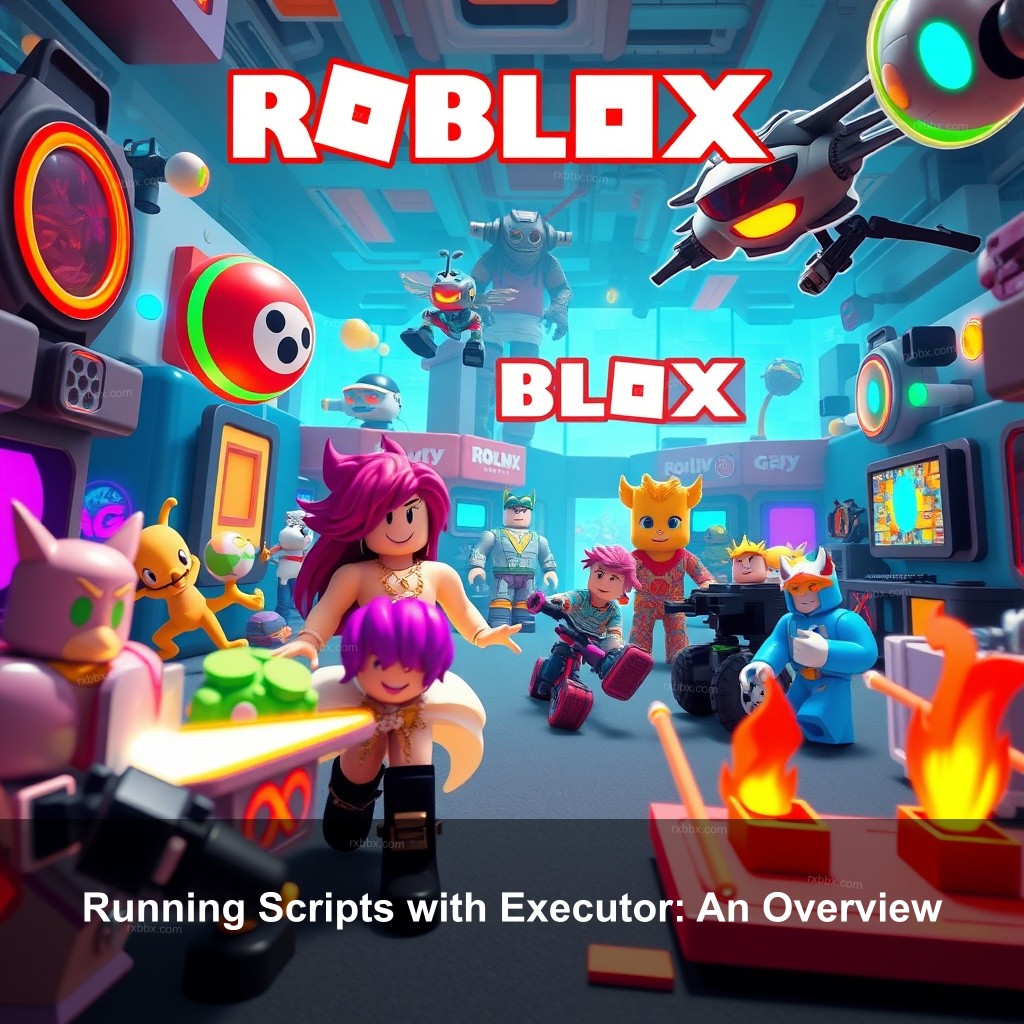Have you ever wanted to automate tasks in Roblox but didn’t know where to start? With the right tools, running scripts can be easy and efficient. In this guide, we’ll explore how to run scripts with an executor, covering everything from setup to execution. By the end, you’ll have the knowledge you need to dive into scripting in Roblox, making your gaming experience even better. Welcome to the RxBBX Gaming Hub, where we simplify gaming tech for you!

Running Scripts with Executor: An Overview
When it comes to managing scripts, an executor is your best friend. An executor allows you to run scripts efficiently, optimizing your workflow in Roblox. Understanding its function is key to unlocking its full potential.
What is an Executor?
Before we get into the details, let’s define what an executor is. An executor is a tool or software that allows users to run scripts in various programming environments. In the context of Roblox, an executor helps automate tasks, manage scripts, and much more. Think of it as an efficient business manager for your coding projects.
Using an executor can offer several benefits:
- Efficiency: Automating repetitive tasks saves time.
- Organization: Keeps your scripts neatly managed.
- Flexibility: Runs scripts in different environments easily.
Common use cases include data processing, automating in-game actions, and executing complex scripts that require precise timing.
Benefits of Using an Executor
Executors streamline your workflow by allowing you to focus on writing scripts rather than managing them. Here are some benefits:
- Reduces manual overhead and minimizes human error.
- Supports batch processing of scripts, allowing multiple scripts to run simultaneously.
- Enables quick troubleshooting through log monitoring.
For example, imagine you have a game with multiple scripts that need to run at specific times. Using an executor, you can automate this process and ensure everything flows smoothly.
Common Use Cases
Executors are versatile tools with various applications. Here are some scenarios where they shine:
- Data Processing: Automate the collection and analysis of game data.
- Task Scheduling: Set scripts to run at predetermined times.
- Complex Automation: Execute scripts that require multiple steps without user intervention.
To sum up, using an executor can significantly improve your scripting experience. If you want to learn more, check out our Best Roblox Executors piece.

How to Set Up Your Executor
Setting up your executor is crucial for a smooth scripting experience. Let’s break it down step by step.
Installation Steps
You first need to install the executor. Usually, this step consists simply downloading the program and following the installing instructions. To minimize security concerns, be sure you download from a reputable source.
After downloading, follow these steps:
- Run the installer.
- Follow the on-screen instructions.
- Open the executor once the installation is complete.
It’s as simple as that! Now you’re ready to configure it for your scripts.
Configuration for First Use
After installation, configure your executor to run scripts effectively. This involves setting directories, establishing execution parameters, and enabling necessary permissions.
Make sure to configure:
- The directory where scripts are stored.
- Execution parameters for your scripts.
- Any environment variables needed for the scripts to run.
Refer to the executor’s documentation for specific configuration instructions tailored to your setup.
Initial Test Run
Before starting with complex scripts, perform an initial test run. Create a simple “Hello World!” script to ensure everything is working properly.
Here’s how to do it:
- Open your executor.
- Create a new script with the following code:
- Run the script and check for output.
print("Hello, World!")
If it prints correctly, you’re ready to move on!
Running Your First Script with Executor
Now that your executor is set up, let’s run your first script!
Step-by-Step Instructions
First, choose an appropriate script to run. For beginners, a simple script is ideal to build confidence. Follow these steps to run your script successfully:
- Open the executor and navigate to your script directory.
- Select the script you want to execute.
- Click the “Run” button.
With these steps, your script should start executing in no time!
Monitoring the Execution
Monitoring is vital to ensure your scripts run smoothly. Most executors feature a logging system that tracks the script’s performance. Here’s what to look for:
- Check for any error messages during execution.
- Review the output in the log file for insights.
- Make adjustments based on the feedback provided in the logs.
Effective monitoring will help you troubleshoot issues quickly.
Common Issues and Troubleshooting
If you encounter problems, don’t worry! Many users face similar challenges when starting. Here are common errors and their solutions:
- Path Errors: Ensure your script’s path is correct.
- Permission Issues: Check that you have the necessary permissions to run the script.
- Script Breaks: Review the code for syntax errors.
Taking these steps will help you overcome common hurdles.
Advanced Executor Features
Once you’re comfortable with the basics, it’s time to check out advanced executor features.
Scheduling and Automating Scripts
One of the standout features of executors is their ability to schedule scripts. Here’s how to set it up:
- Select the script you want to schedule.
- Set the time and frequency for execution.
- Save your settings.
Automating repetitive tasks can save you significant time!
Utilizing Environment Variables
Environment variables play an important role in script execution. They allow scripts to access specific data without hardcoding it. Here’s why they matter:
- They enable dynamic configuration based on the environment.
- Reduce the need for multiple versions of the same script.
- Facilitate smoother integration with other applications.
Use environment variables wisely to improve your script’s functionality.
Error Handling in Scripts
Maintaining script stability requires error handling. Put plans into place in your code to handle unanticipated problems. To gently manage mistakes in your scripts, think about including try-catch blocks.
When errors occur, your script can log the issue and continue running, which is important for long-running tasks.
Tips for Effective Script Execution
To maximize your success with script execution, keep these tips in mind.
Best Practices
Writing efficient scripts is key to smooth execution. Here are some best practices:
- Write clear, concise code to enhance readability.
- Test scripts in segments to catch errors early.
- Document your code for future reference.
Using these practices will lead to better script performance overall.
Regular Maintenance
Like any tool, executors require regular maintenance. Schedule reviews to ensure scripts are up to date and functioning as expected. This might involve:
- Refactoring outdated scripts.
- Updating dependencies.
- Replacing deprecated features with newer alternatives.
Consistent maintenance will keep your scripts running smoothly.
Keeping Up with Updates
Software evolves quickly! Regularly check for updates to your executor and scripts. New features can improve performance and offer additional capabilities that can simplify your tasks.
Staying informed will keep you ahead of the game.
Community Resources
Engaging with the community can greatly boost your scripting journey. Here are some resources to consider:
Online Forums and Communities
Participate in forums where users discuss their experiences and share tips. These communities can be incredibly supportive and helpful for troubleshooting.
Find platforms like Reddit or Discord groups focused on Roblox scripting.
Documentation and Tutorials
Utilize official documentation and tutorials to deepen your knowledge. Comprehensive guides often provide insights not found elsewhere.
Check our Roblox Executor Guide for more detailed information.
User-Contributed Scripts
Don’t hesitate to check out scripts shared by other users. These can provide inspiration and practical examples of what’s possible.
Look for repositories on GitHub or discussion boards where users share their favorite scripts.
FAQs
What is the best executor for Roblox?
The best executor often depends on personal preference and specific needs. Popular options include Synapse X and KRNL, which are known for their reliability and range of features.
How do I fix common script execution errors?
Common fixes involve checking script paths, verifying permissions, and reviewing code for syntax errors. Always refer to logs for specific error messages that can guide your troubleshooting.
Can I schedule scripts to run automatically?
Correct! Most executors let you design scripts to run at designated intervals or times. Automating chores would be much benefited from this ability.
How do I create an environment variable in Roblox?
Creating environment variables typically involves accessing the executor’s settings and defining the variables you wish to use. Refer to your executor’s documentation for specific instructions.
Is scripting in Roblox difficult for beginners?
Scripting can be challenging at first, but with practice and the right resources, anyone can learn. Start with simple scripts and gradually progress to more complex projects.
Conclusion
To sum up, understanding how to run scripts with an executor can greatly enhance your Roblox experience. From installation to advanced features, executing scripts opens up a variety of possibilities. Interested in more insights? Join the conversation at the RxBBX Gaming Hub, and share your thoughts or experiences with scripting!
